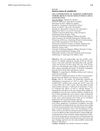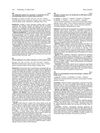2 citations,
September 1971 in “Metabolism, clinical and experimental” Dihydrotestosterone has a reduced effect on muscle-building in people with testicular feminization syndrome, especially after their gonads are removed.
 July 2023 in “The journal of sexual medicine”
July 2023 in “The journal of sexual medicine” Anabolic-androgenic steroids harm male hormone levels, sperm, metabolism, and can cause acne, hair loss, and breast growth.
33 citations,
December 2017 in “Journal of neuroendocrinology” Sex and stress steroids quickly change brain cell structures in the hippocampus.
 3 citations,
December 2016 in “Journal of epidemiological research”
3 citations,
December 2016 in “Journal of epidemiological research” Estrogen and androgenic hair increase melanoma risk, especially in European-ancestry individuals.
 19 citations,
March 1998 in “Endocrinology”
19 citations,
March 1998 in “Endocrinology” Male rats have more somatostatin neurons than females due to testosterone converting to estrogen during early development.
 February 2024 in “Hormones”
February 2024 in “Hormones” Future hormone therapy trials should match the diverse needs and priorities of the gender-diverse community.
 2 citations,
December 2020 in “Phytomedicine plus”
2 citations,
December 2020 in “Phytomedicine plus” Taking Saw palmetto and Pygeum africana can change the levels of certain steroids in urine, which could cause confusion in doping tests.
154 citations,
October 1996 in “Proceedings of the National Academy of Sciences of the United States of America” Estrogen affects hair growth and skin cell multiplication.
10 citations,
February 2017 in “European journal of neuroscience/EJN. European journal of neuroscience” The availability of certain hormones and specific stimulation patterns affect long-term synaptic changes in the male rat brain.
 January 2024 in “Biology of sex differences”
January 2024 in “Biology of sex differences” Dihydrotestosterone makes arteries stiffer in female mice by reducing estrogen receptor expression.
 72 citations,
October 1998 in “Baillière's clinical endocrinology and metabolism”
72 citations,
October 1998 in “Baillière's clinical endocrinology and metabolism” Long-term testosterone therapy can cause hormone suppression, affect prostate and heart health, and alter physical characteristics, but does not increase prostate cancer risk and needs more research for full risk assessment.
 67 citations,
May 2018 in “Journal of Ginseng Research”
67 citations,
May 2018 in “Journal of Ginseng Research” Red ginseng may improve immunity, fatigue, memory, blood circulation, and menopausal symptoms, and is generally safe to consume.
 67 citations,
October 2005 in “Annals of Oncology”
67 citations,
October 2005 in “Annals of Oncology” Fulvestrant is a well-tolerated new treatment for advanced breast cancer that may delay chemotherapy.
 48 citations,
July 1996 in “Human & Experimental Toxicology”
48 citations,
July 1996 in “Human & Experimental Toxicology” Human enzymes can detoxify harmful substances but might also increase their cancer risk.
 17 citations,
June 2019 in “BMC genomics”
17 citations,
June 2019 in “BMC genomics” Non-coding RNAs help control hair growth in cashmere goats.
5 citations,
February 2019 in “Neuroscience letters” Hormones during puberty increase certain receptors in the brain, and this change is influenced by estrogen levels.
 July 2023 in “Frontiers in veterinary science”
July 2023 in “Frontiers in veterinary science” Certain long non-coding RNAs are important for controlling hair growth cycles in sheep.
 March 2010 in “Ejc Supplements”
March 2010 in “Ejc Supplements” CK 5/6 expression in breast cancer is linked to negative hormone receptor status and higher tumor grade.
 65 citations,
January 2011 in “Frontiers in Endocrinology”
65 citations,
January 2011 in “Frontiers in Endocrinology” Neurosteroids show promise for treating epilepsy and more research is needed.
 16 citations,
July 2002 in “JOGC/Journal of obstetrics and gynaecology Canada”
16 citations,
July 2002 in “JOGC/Journal of obstetrics and gynaecology Canada” Birth control pills can help reduce mild to moderate acne in women.
 8 citations,
February 2003 in “Annals of Neurology”
8 citations,
February 2003 in “Annals of Neurology” Progesterone treatment improved seizures in a woman with menstrual cycle-related epilepsy, but a wrong medication worsened her condition.
 4 citations,
August 2011 in “Aktuelle Dermatologie”
4 citations,
August 2011 in “Aktuelle Dermatologie” Topical melatonin is a safe treatment that may reduce hair loss in people with androgenetic alopecia.
 2 citations,
February 2003 in “Annals of Neurology”
2 citations,
February 2003 in “Annals of Neurology” Neuroimaging suggests that treatments targeting brain steroids could help control epilepsy, especially types linked to the menstrual cycle.
 October 2020 in “Authorea (Authorea)”
October 2020 in “Authorea (Authorea)” Men and women react differently to opioids, with hormones potentially influencing these differences.
34 citations,
February 2015 in “Frontiers in Cellular Neuroscience” Zebrafish helped find new ways to prevent drug-induced hair cell death and potential treatments for hearing loss.
 2 citations,
April 2023 in “Pharmaceuticals”
2 citations,
April 2023 in “Pharmaceuticals” Testosterone therapy for postmenopausal women appears safe and may protect against heart disease, but requires constant monitoring and more research for long-term effects.
 November 2024 in “Frontiers in Medicine”
November 2024 in “Frontiers in Medicine” Cirrhosis affects quality of life with various symptoms, requiring a holistic, multidisciplinary approach for management.
29 citations,
October 2020 in “Environmental health perspectives” Five preservatives may disrupt hormone function and need more health and environmental risk assessment.
 5 citations,
August 2018 in “Sexual Medicine Reviews”
5 citations,
August 2018 in “Sexual Medicine Reviews” 5α-Reductase inhibitors do not consistently increase testosterone levels in the blood.
3 citations,
February 2015 in “Mechanisms of development” Hormones and stretching both needed for nipple area skin growth in mice.





















